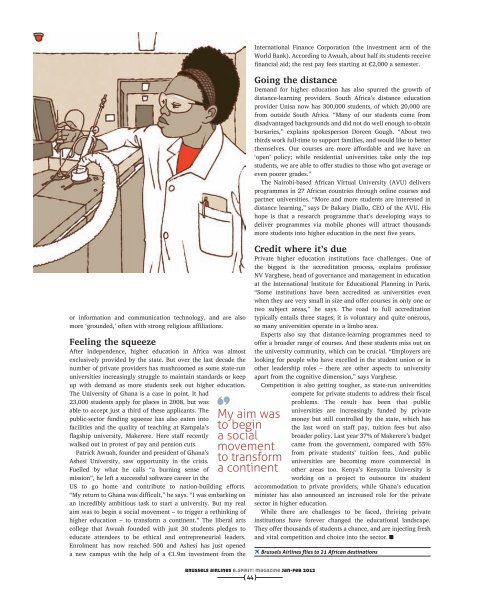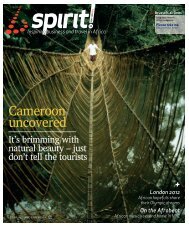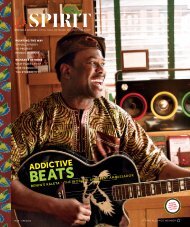Create successful ePaper yourself
Turn your PDF publications into a flip-book with our unique Google optimized e-Paper software.
or information and communication technology, and are also<br />
more ‘grounded,’ often with strong religious affiliations.<br />
Feeling the squeeze<br />
After independence, higher education in Africa was almost<br />
exclusively provided by the state. But over the last decade the<br />
number of private providers has mushroomed as some state-run<br />
universities increasingly struggle to maintain standards or keep<br />
up with demand as more students seek out higher education.<br />
The University of Ghana is a case in point. It had<br />
23,000 students apply for places in 2008, but was<br />
able to accept just a third of these applicants. The<br />
public-sector funding squeeze has also eaten into<br />
facilities and the quality of teaching at Kampala’s<br />
flagship university, Makerere. Here staff recently<br />
walked out in protest of pay and pension cuts.<br />
Patrick Awuah, founder and president of Ghana’s<br />
Ashesi University, saw opportunity in the crisis.<br />
Fuelled by what he calls “a burning sense of<br />
mission”, he left a successful software career in the<br />
US to go home and contribute to nation-building efforts.<br />
“My return to Ghana was difficult,” he says. “I was embarking on<br />
an incredibly ambitious task to start a university. But my real<br />
aim was to begin a social movement – to trigger a rethinking of<br />
higher education – to transform a continent.” The liberal arts<br />
college that Awuah founded with just 30 students pledges to<br />
educate attendees to be ethical and entrepreneurial leaders.<br />
Enrolment has now reached 500 and Ashesi has just opened<br />
a new campus with the help of a €1.9m investment from the<br />
My aim was<br />
to begin<br />
a social<br />
movement<br />
to transform<br />
a continent<br />
brussels airlines b.spirit! magazine jan-feb <br />
{ 44 }<br />
International Finance Corporation (the investment arm of the<br />
World Bank). According to Awuah, about half its students receive<br />
financial aid; the rest pay fees starting at €2,000 a semester.<br />
Going the distance<br />
Demand for higher education has also spurred the growth of<br />
distance-learning providers. South Africa’s distance education<br />
provider Unisa now has 300,000 students, of which 20,000 are<br />
from outside South Africa. “Many of our students come from<br />
disadvantaged backgrounds and did not do well enough to obtain<br />
bursaries,” explains spokesperson Doreen Gough. “About two<br />
thirds work full-time to support families, and would like to better<br />
themselves. Our courses are more affordable and we have an<br />
‘open’ policy; while residential universities take only the top<br />
students, we are able to offer studies to those who got average or<br />
even poorer grades.”<br />
The Nairobi-based African Virtual University (AVU) delivers<br />
programmes in 27 African countries through online courses and<br />
partner universities. “More and more students are interested in<br />
distance learning,” says Dr Bakary Diallo, CEO of the AVU. His<br />
hope is that a research programme that’s developing ways to<br />
deliver programmes via mobile phones will attract thousands<br />
more students into higher education in the next five years.<br />
Credit where it’s due<br />
Private higher education institutions face challenges. One of<br />
the biggest is the accreditation process, explains professor<br />
NV Varghese, head of governance and management in education<br />
at the International Institute for Educational Planning in Paris.<br />
“Some institutions have been accredited as universities even<br />
when they are very small in size and offer courses in only one or<br />
two subject areas,” he says. The road to full accreditation<br />
typically entails three stages; it is voluntary and quite onerous,<br />
so many universities operate in a limbo area.<br />
Experts also say that distance-learning programmes need to<br />
offer a broader range of courses. And these students miss out on<br />
the university community, which can be crucial. “Employers are<br />
looking for people who have excelled in the student union or in<br />
other leadership roles – there are other aspects to university<br />
apart from the cognitive dimension,” says Varghese.<br />
Competition is also getting tougher, as state-run universities<br />
compete for private students to address their fiscal<br />
problems. The result has been that public<br />
universities are increasingly funded by private<br />
money but still controlled by the state, which has<br />
the last word on staff pay, tuition fees but also<br />
broader policy. Last year 37% of Makerere’s budget<br />
came from the government, compared with 55%<br />
from private students’ tuition fees. And public<br />
universities are becoming more commercial in<br />
other areas too. Kenya’s Kenyatta University is<br />
working on a project to outsource its student<br />
accommodation to private providers, while Ghana’s education<br />
minister has also announced an increased role for the private<br />
sector in higher education.<br />
While there are challenges to be faced, thriving private<br />
institutions have forever changed the educational landscape.<br />
They offer thousands of students a chance, and are injecting fresh<br />
and vital competition and choice into the sector.<br />
Brussels Airlines flies to 21 African destinations











